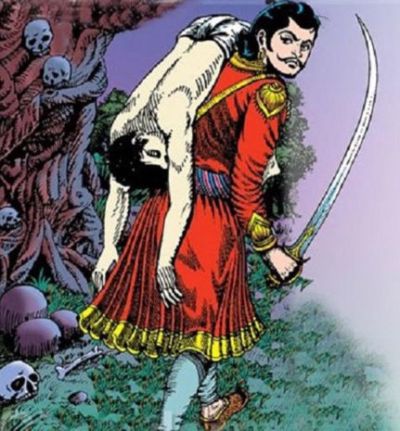Read the previous part here…
Rishi Kaṇva was pleased. “You have promised to protect all living beings, and have thus made me very happy. You can ask me for any vardāna (boon) that you desire!”
The king, who was well-versed in the matters of timing, replied…
“Oh great Rishi, if you are truly pleased with me, then give me your daughter Indīvaraprabhā’s hand in marriage.”

इत्य् उक्तस् तेन मुनिना कालज्ञः स नृपो ऽभ्यधात् ।
तुष्टो ऽसि चेत् सुतां देहि मह्यम् इन्दीवरप्रभाम् ॥ १२,२७.४७ ॥
इत्य् अर्थितवते सो ऽस्मै राज्ञे स्नानगतां मुनिः ।
अप्सरःसंभवां कन्यां तां ददाव् अनुरूपिकाम् ॥ १२,२७.४८ ॥
ततः कृतविवाहस् तां मुनिभार्याप्रसाधिताम् ।
कृतानुयात्राम् उद्बाष्पैस् तापसैर् आ निजाश्रमात् ॥ १२,२७.४९ ॥
इन्दीवरप्रभां भार्याम् आदायारुह्य वाजिनम् ।
चन्द्रावलोकस् तरसा प्रतस्थे स ततो नृपः ॥ १२,२७.५० ॥
गच्छतश् चास्य विततं दृष्ट्वा तद्दिनचेष्टितम् ।
रविः खिन्न इवास्ताद्रिम् अस्तके समुपाविशत् ॥ १२,२७.५१ ॥
ददृशे मृगनेत्रा च क्रमाद् उद्रिक्तमन्मथा ।
ध्वान्तनीलपटच्छन्नरूपा रात्र्यभिसारिका ॥ १२,२७.५२ ॥
“Tathāstu!”, said Rishi Kaṇva. And so Indīvaraprabhā, the one who had been of an Apsara, was given to the king.
The wives of the other rishis got her ready, and then brought her to the mantapā, where the marriage was solemnized as per vedic rites.
Once done, King Candrāvaloka mounted his horse and set out from there, with his newly-wedded wife, as the rishis followed them to the border of the āshramā, as they bid her a tearful farewell.
And as he rode along, the sun, seeing that the day had been prolonged, sat down in the west, wearily, behind the peaks of the nearby mountain.
In the course of time, the gazelle-eyed lady of the night came to the fore, overflowing with love and passion, her beautiful shape clad in the robe of darkness.
तस्मिन् काले पथि प्राप स राजाश्वत्थपादपम् ।
सज्जनाशयसुस्वच्छवापीजलतटस्थितम् ॥ १२,२७.५३ ॥
शाखापत्त्रौघसंछन्नशाद्वलश्यामलस्थलम् ।
दृष्ट्वा च तं वसामीह रात्रिम् इत्य् अकरोद् धृदि ॥ १२,२७.५४ ॥
ततो ऽवतीर्य तुरगाद् दत्त्वा तस्मै तृणोदकम् ।
विश्रम्य पुलिने वाप्या उपयुक्ताम्बुमारुतः ॥ १२,२७.५५ ॥
मुनिपुत्रिकया सार्धं तया तस्य तरोस् तले ।
प्रियया पुष्पशय्यायां संविवेश स भूपतिः ॥ १२,२७.५६ ॥
तत्क्षणं च समाक्रम्य तिमिरांशुकहारिणा ।
सरागम् आननं प्राच्याश् चुचुम्बे शशलक्ष्मणा ॥ १२,२७.५७ ॥
विरेजुश् चन्द्रकिरणैः समाश्लिष्य प्रसारिताः ।
वीतमानावकाशाश् चाशेषा वितमसो दिशः ॥ १२,२७.५८ ॥
अत्रान्तरे लतागुल्मविवरप्रसृतैः करैः ।
ऐन्दवै रत्नदीपाभैस् तरुमूले विभासिते ॥ १२,२७.५९ ॥
And in that moment, the king came across an aśvattha tree, on the banks of a lake, the waters of which were as transparent as a good man’s heart.
He noticed that the ground beneath the tree was well-shaded, and grassy, and so he thought to himself that this was the best place to spend that night.
And so the tired King Candrāvaloka dismounted from his horse, fed it some grass and water, so that it was refreshed, and then lay down next to his wife, on the banks of the river, in the shade of the tree.
The moon arose a few minutes after, lifting the veil of darkness, kissing the glowing face of the East. The whole sky shone forth without any shyness, and there was moonlight all around.
The rays of the moon shone through the interlaces of the creepers nearby, and lit up the foot of the tree like bejeweled lamps…
The next morning…
to be continued…
